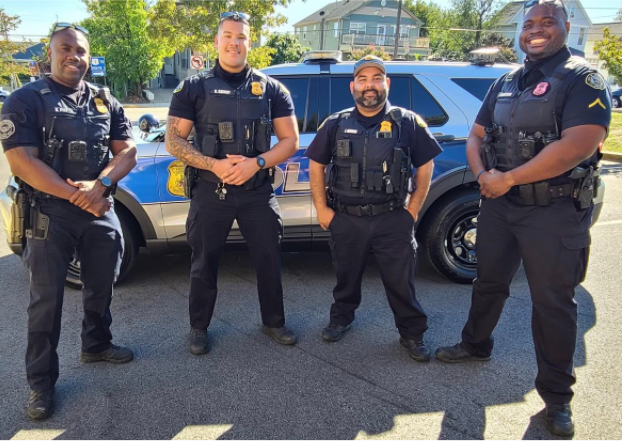Experts believe prioritizing police mental health can lead to better officers as the Hyattsville Police Department set to begin mandatory mental health check-ins in December.
Four HCPD officers after earning their Crisis Intervention Team certification in October (The City of Hyattsville Police Department Facebook page)
The Hyattsville City Police Department (HCPD) will begin requiring officers and dispatchers to participate in quarterly mental health check-ins as a part of HCPD’s Mental Health and Wellness program in December.
The check-ins are mandatory and include personal clinical evaluations, training to help officers cope and talk therapy. HCPD administrators will not use the evaluations to assess an employee’s fitness for-duty, according to Hyattsville city council documents. Sessions are set to begin in December and will occur quarterly, in March and June 2022.
The initiative comes after HCPD conducted a survey in December 2020 that highlighted the department’s need for additional mental health support, according to Hyattsville City Council documents. The department received funding for the check-in program in October 2021 after the city council passed legislation allocating $45,900 of the 2022 city budget towards the program.
The check-ins are one component of HCPD’s new Mental Health and Wellness program, designed by Adrienne Augustus, HCPD manager of media relations and mental health programs.
The overall program includes free training designed to assist officers and dispatchers when responding to stressful situations and in coping with work-related traumas.
Augustus said that since introducing the idea into the department, there are mixed feelings on the implementation of the program with some officers concerned and some pleased at the idea. She said it is hard to tell where everyone stands as there have been new officers introduced into the department and she is still updating all of the new officers.
According to Augustus, the department will provide their officers with anonymous surveys before and after each evaluation to address any of the issues and successes of the program.
“Surveys will help us determine if changes need to be made immediately, will show us where there may be early success as well as for the long-term. We want this program to help people,” Augustus said.
HCPD extended the program to the Brentwood Police Department after receiving a grant for $118,800 from the Department of Justice’s Community-Oriented Policing Services. The grant also ensures that all officers and dispatchers in the Brentwood’s police department are able to see licensed mental health practitioners once a month for free.
“We are very blessed and thankful that Adrienne and the Hyattsville police department thought of us, because it [the services] can be very costly,” said Brentwood Police Department Chief of Police Robert Althoff.
Althoff said programs like these did not exist 40 years ago when he started his career and that these services “should have been provided a long time ago.”
There are similar programs in other departments across the state, including the Baltimore City Police Department’s (BPD) Employee Assistance Program. BPD’s Employee Assistance program is free, confidential and available to all employees and their household members at no cost. However, BPD’s program is not mandatory.
BPD Deputy Director of Officer Safety and Wellness Lt. Charles K. Sullivan said that he has seen a cultural shift in the department since the program’s implementation. “You're seeing officers less afraid and more willing to seek help when they have certain issues come up,” he said.
Lt. Sullivan also said that the program also benefits the families of officers and the communities they serve. “I would like to think that a healthier officer is going to be a better officer for themselves, for their families and for the community,” the deputy director said.
Founder of Resilience Works Katherine Manners agrees. She says developing programs like these are crucial as policing is a tough job, particularly for officers of color. She said that officers are constantly exposed to other people’s trauma and life/death situations. And believes that it is “essential” for officers and first-responders to process this trauma.
However, Manners said overall, the current policing culture does not lend itself to developing effective programs for officers and that the creation of successful programs requires a culture change in the industry, which “has to come from the top.”
The founder cited changes like normalizing the stress of the job and cultivating a safe space in the workplace where mental health isn’t stigmatized.
Manners also said that the programs must be mandatory. “Mandatory is critical, officers won’t go on their own and it starts to normalize it,” she said. “You gotta break through that culture.”
Owner of Survival Mindset Consulting, a consulting firm for police and first responders, Chris Scallon said that an effective program needs to include trauma prevention (resources to help officers avoid or lessen the trauma absorbed), intervention (providing the appropriate resources) and post-prevention (setting up treatment consistency).
Scallon also said that effective programs should be mandatory, incorporate the spouses and partners of officers, have resources that address all levels of the trauma spectrum and include mental health professionals who are “culturally competent” in the police culture.
“Just because you are a clinician doesn't mean that you are culturally competent to treat an officer,” he said.
Scallon said that it is just as important that these programs address and protect the intersectional identities of officers, especially those that are Black, LGBTQ+, mothers and veterans. He said that departments must design these programs with these groups in mind in order to service their whole identities.
“We put things in the category of police and society,” Scallon said. “When we go home, we are part of society.”
The Hyattsville Police Department is set to launch the program in early December.

